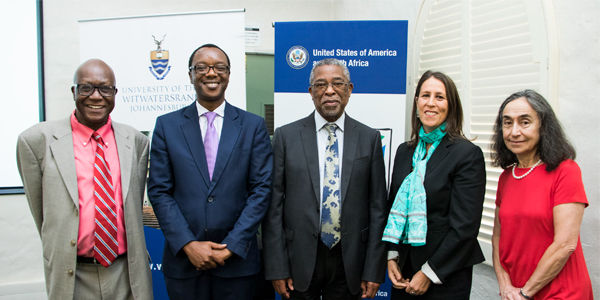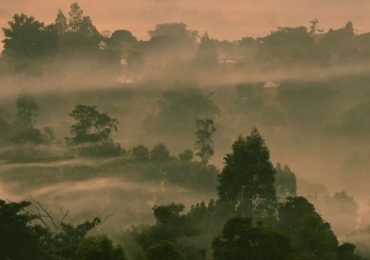The African Centre for the Study of the United States (ACSUS), a new research centre based at Wits University, Johannesburg, caused something of a stir when it was announced in March.
The Centre, led by Wits University Vice-Principal Professor Tawana Kupe and Professor Gilbert Khadiagala, has the aim of serving as an intellectual base for the study of America and its relationship to Africa.
The JRB Editor Jennifer Malec chatted to Kupe about the Centre and its ambitions.

Jennifer Malec for The JRB: How did the idea for the African Centre for the Study of the United States come about?
Tawana Kupe: The origins of the idea came from a group of people—including Mr Moeletsi Mbeki—who wanted an institution studying the relationships between South Africa and the US that could be created in partnership with the University. It then evolved from there into something that the University would lead as an African Centre (not just a South African one), studying the United States of America as a society and nation in its totality; all aspects, from politics and history, economics and trade, arts, culture and the media, to technology, health, education and transportation.
The JRB: What are ACSUS’s objectives? While the brochure suggests that ACSUS hopes to satisfy ‘an urgent need for Africans to turn a critical analytical African focus on a nation and society that is a major world power—and has been and is an important actor involved in Africa’s present and future’, I’m sure they are more various than a simple turning of the anthropological tables.
Tawana Kupe: The objectives are to produce knowledge, through research, for example, that would enable Africans to understand a powerful nation and its influence, interactions and intersections with the world and Africa. This understanding would enable Africans to formulate their own positions on relations, including trade and economic relations, with the US, as well learn that which could be useful and appropriate for Africa’s own development. Related objectives are to produce a new generation of scholars and students of the US that are an intellectual resource for understanding the US, and by extension the world. Another objective is as a facilitator of partnerships with primarily universities, think-tanks and US institutions of different kinds.
The JRB: Do you see the Centre as part of a larger decolonisation project?
Tawana Kupe: Definitely, in the sense that the creation of the Centre is testimony that Africans are seeking to understand the United States from their own multiple perspectives and primarily for themselves. Decolonisation in relation to dominant nations and societies operates through not accepting the self-definitions of that society, but generating your own knowledge and understandings. In that respect this is going to be an exciting intellectual exploration that bucks the dominant trend to receive knowledge instead of creating it.
The JRB: When Achille Mbembe shared a photograph of the ACSUS pamphlet on his Facebook page, the image was shared over 800 times, with well over 1,000 likes. The idea of the Centre clearly resonates strongly with African academics and intellectuals.
Tawana Kupe: I think it is the audacity of the idea! Who thought that Africans could have the confidence, some might say the cheek, to study what is considered the mighty United States that everyone knows and understands? I think subconsciously the excitement might have been about people feeling mentally released or freed to study what people might think is a crazy undertaking and with it the possibility of extending their horizons as Africans. Finally, the realisation that studying ourselves—Africa—does not mean we cannot also study the world. In this way, by studying the world, we by implication get to understand what is and what could be our places and spaces in it.
The JRB: ACSUS proposes to cast a wide intellectual net, incorporating programmes spanning the social sciences and the humanities, and involving teaching, research, supervision, public lectures, seminars and so on. How will such an ambitious project mesh with existing academic structures?
Tawana Kupe: The Centre seeks to complement existing programmes, including other centres and institutes through partnerships and joint programmes. So, for example, we are going to partner with colleagues in the English Department to host a conference with international colleagues on Cultures of Populism, where appropriate colleagues can run their projects focused on the US.
The JRB: ACSUS will be located at Wits, but its reach appears to be Pan-African in scope. How do you envision ACSUS’s potential to work alongside organisations such as the Southern African Development Community, the Economic Community of West African States and the African Union, as well as other tertiary institutions, in forging local and Africa-wide networks?
Tawana Kupe: In the first instance we are seeking to partner with universities, think-tanks and research institutes and when funds become available hire colleagues from across our continent. With regard to the regional economic blocs and the African Union we wish to study their interactions with the US as well to become a source of independent analysis and information useful for their formulation of policies towards and engagement with the US and its institutions. In this regard we would like to run courses on public diplomacy for African diplomats and create a space where they can dialogue and reflect on their experiences as African diplomats who have been posted to the US.
The JRB: In the comments on Achille Mbembe’s Facebook post, people mention two similar former initiatives, the Center for Africa’s International Relations, founded in 2000, and the Southern Africa Association for American Studies, founded in the 1990s. Safundi, the Journal of South African and American Studies, has also established itself as perhaps the key publication for the investigation of the US from a specifically South African perspective. How does ACSUS distinguish itself from these earlier cultural exchanges, and how do you think it sets itself apart from contemporary initiatives with similar interests?
Tawana Kupe: First and foremost we are an academic institution located in a leading, research-intensive university. We will produce high quality, peer-reviewed knowledge in the form of books, book chapters, monographs and journal articles. Second, we will train postgraduate students and postdoctoral fellows. Third, we will engage, where we have expertise, in commercial consulting for clients in Africa and the US. Fourth, we will adopt a multidisciplinary, interdisciplinary and trans-disciplinary approach to knowledge production, which is the best way to generate deep and truly multi-perspectival knowledge. Fifth, we will seek strong partnerships in the US and across the continent. All these activities will be linked and complementary.
The JRB: Early supporters of the Centre include the United States-based University of the Witwatersrand Fund, The Bergman family, the US Embassy in South Africa and the Ford Foundation. Until now, would you say that it been difficult for African universities to secure funding from the United States?
Tawana Kupe: No, I would not say so. Wits and the University of Cape Town in particular receive considerable funding from foundations and alumni in the United States. The Centre is likely going to diversify the sources of funding from the United States, which is good as long as it does not compromise our intellectual independence.
The JRB: I believe Moeletsi Mbeki, Deputy Chairman of the South African Institute of International Affairs, who you mentioned earlier, was the first private funder to be involved. Are there plans to source more support from African-based individuals and funds?
Tawana Kupe: Thanks to him, without his support the project would not have got off the ground. It is also unusual that an African puts his money where his mouth is on a project of this kind in a university. Our financial model is to ensure or protect our intellectual independence by pursuing a diverse mix of funders, including funding from African individuals, companies, institutions and foundations. The strategy includes generating income from our own activities, for example through courses and consulting.
The JRB: From a literary point of view, a great number of major international novels written by Africans are partly set in the United States, and many of Africa’s most well-known authors are based there. Do you think the Centre will open up a space for hosting authors and forging conversations about their work?
Tawana Kupe: Absolutely, because this kind of literary activity is in itself a creative form of exploration of the US as a space and constitutes a form of knowledge. So we will seek such authors (as well as artists, playwrights, film and documentary makers) and host them at the Centre for dialogues and conversations.
The JRB: Do you have any conferences or events planned? Where can people keep in touch with the Centre’s events?
Tawana Kupe: Yes, we do. The Cultures of Populism Conference next year is an example. We are planning some seminars for this year, too. Such information will be available on the ACSUS website.
- Jennifer Malec is the Editor; follow her on Twitter.





